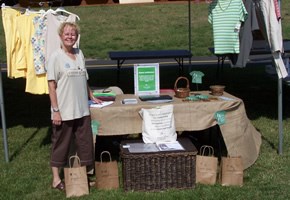BY
BILL BRADLEY
How can you make the world a better place?
Start with your clothes, says Penny Baker, the manager of
Cotton Ginny, a national women's clothes retailer.
The store is re-opening next week in the New Sudbury
Shopping Centre with a new line of organic cotton products as
well as an expanded selection of clothing sizes, ranging from
sizes 3 to 24.
"Cotton Ginny has been selling cotton products to Canadian
women since 1979. Last year we tested a new line of
eco-garments, based on organic cotton and sourced from farmers
who do not use pesticides or herbicides, to produce cotton
T-shirts, a fleece line and infant clothing. Best of all, the
clothes, in all sizes, are still within the same price range,"
said Baker.
As consumers, we put cotton next to our skin because it
breathes, absorbs moisture and comforts us because it is soft.
However, cotton is a highly toxic crop using one quarter of
all insecticides in the world even though it's only farmed on
three percent of the world's farmland, says a fact sheet on
United States cotton, produced by the Organic Consumers
Association.
Five of the top nine pesticides used in the production of
cotton - cyanide, dicofol, naled, propargite and trifluran -
are known as cancer-causing chemicals. All nine pesticides used
are classified by the United States Environmental Protection
Agency as Category 1 and 2, the most dangerous chemicals.
The problems associated with clothing production do not stop
in the field, say environmental retailers.
"During the conversion of conventional cotton into clothing,
numerous toxic chemicals are added at each stage, including
silicone waxes, harsh petroleum scours, softeners, heavy
metals, flame and soil retardants, ammonia and formaldehyde,"
reads a statement on Ecochoices' website, a United States
natural living store.
Cotton can be produced with less chemical input or none at
all.
According to the Organic Trade Association, in 2000-2001
international production of organic cotton was approximately
6,368 metric tons, grown in 12 countries, and accounted for .03
percent of global cotton production.
Organic methods include crop rotation, cover cropping with
nitrogen rich legumes, animal manuring, flame weeding and other
mechanical practices.
"Cotton Ginny sources our organic cotton from India and
China, all certified by European organic certification
organizations," says Baker, adding by fall more cotton will be
organic in her store. "It's your choice when you choose to buy
your clothes, to be part of the solution or part of the
problem."
Phone 524-5491 for more information.
